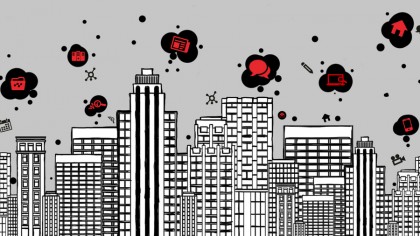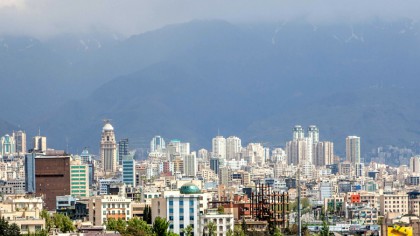What are the consequences of the great IP address sell-off?
A second-hand market for IPv4 addresses is having some odd ramifications

Introduction
When IPv4 was established as the standard back in 1981, few could envisage just how quickly the 4.3 billion IP addresses would run out. With the digital horizon filled by the Internet of Things, wearables, connected cars, smart cities and the next billion web users, the world is now switching on to IPv6 to cope with the next stage of internet growth.
But the gradual shift is creating a bizarre second-hand market for unused IPv4 addresses with Iran and Saudi Arabia importing them from the likes of Ukraine and Hungary. Is the web losing its geography? Does it even have a geography? And what does the market for IPv4 tell us about the progress of IPv6?
We delve into these issues and more in the following slideshow…
- Also check out: Back to basics: is Web 1.0 making a comeback?

A battle of resources
This is a battle of resources. IPv4 addresses are almost gone, but IPv6 is not yet universal. The majority of the Regional Internet Registries (RIRs) that control IPv4 addresses have exhausted their supply.
"If you knew that everyone from a specific pool of IP addresses used to be based in a specific region, you now need to keep up to date with where that pool of IP addresses now belongs, as it may have been resold outside the domain of the original RIR responsible for its deployment," says Sion Lloyd, Researcher at Nominet UK, a nonprofit that runs the .uk registry and manages the UK's internet infrastructure.
At its core the market for IPv4 IP addresses exists because everyone wants to stay accessible. "A large proportion of internet users are unable to connect to a service that is only made available over the newer IPv6 protocol," says Lloyd. "If you want to be reachable by all, you need an IPv4 address … new entities cannot get these through the traditional RIR route, so need to get them from this secondary market."
"Africa's AFRINIC is now the only RIR with a significant amount of IPv4 addresses remaining," says Axel Pawlik, Managing Director of the RIPE NCC, the RIR responsible for Europe, the Middle East and parts of Central Asia. RIPE NCC exhausted its own IPv4 addresses in September 2012. AFRINIC will continue to dish out IPv4 addresses until April 2019.

IPv4 resale market
So why is the IPv4 resale market flourishing? Largely because IPv6 is not backwards-compatible with IPv4, and both protocols will operate side-by-side for some time to come. "When enabling IPv6 on a service or computer, IPv4 needs to remain in place to ensure connectivity to services or users that only support IPv4," says Axel Pawlik. "Once IPv6 has been sufficiently deployed, IPv4 can be switched off and we'll have an IPv6-only internet."
Since both will need to coexist, organisations are looking for ways to prolong the life of IPv4 – and that means purchasing IPv4 addresses from elsewhere. "It's unclear exactly how long the IPv4 market will last – if IPv6 deployment soared overnight, IPv4 addresses would hold little value," says Pawlik. "Ultimately, when the cost of buying IPv4 addresses becomes more than the cost of deploying IPv6, we expect to see a major shift in the market."

Geography of the web
Another good question is: Does it matter if the web loses its geography? But in actual fact, geography was never a core function of domain names. We may have region-specific web addresses now – such as .co.uk – but the internet is mostly decentralised. "Many of the dominant top-level domains historically – .com, .org and .net – have never been geographic," observes Sion Lloyd.
In short, it's the IP addresses themselves that are being sold irrespective of the domain name. The top-level domain (TLD) of a website has nothing to do with where it is hosted. "Selling IP space will not affect the naming of websites, or vice versa," says Lloyd, though he admits that there are sometimes problems.
"The only situation in which it might become an issue is if you use IP address lookups or filtering to identify and route visitors to your website, so it will be important to keep your database up to date as IPv4 addresses change hands," notes Lloyd. "This will allow you to redirect, for example, British visitors to your website to the UK rather than the US or Gambian version of the site."
This is why it is important that any IPv4 transfers are reflected in the RIPE Database, which contains information about the current holder of an address block. "There is also the risk that addresses being sold may be blacklisted for previous spamming or other network abuse, which can create issues for the new address holder," adds Axel Pawlik.
He further notes that the geographic distinctions are merely for administrative reasons. "The beauty of the internet is that it is an open network of networks that spans the entire world, and the main concern over IPv4 trading is not that the internet will lose geography, but that IPv4 remains an insufficient solution for the next billion people to come online."

Who is buying IPv4 addresses?
So which countries/regions are buying up 'old' IPv4 addresses? Between October 2012 and May 2015, Iran bought over 1.4 million IPv4 addresses, and exported just 1,280, while Saudi Arabia imported over 1.9 million and exported just 6,144, according to RIPE NCC. That makes them the two leading IPv4 purchasers in the service region, though the traders of IP addresses are mostly telecoms companies and ISPs, rather than nations.
It's perhaps counter-intuitive, but the popularity of IPv4 as a second-hand commodity can be a clear sign of IPv6 take-up. "Some networks also find that selling unused IPv4 addresses can actually help to fund future internet infrastructure developments and IPv6 deployments," says Axel Pawlik.
In May, the UK government began selling some of its legacy IPv4 addresses, and networks in the Ukraine and Hungary regularly sell unused IPv4 addresses. "We expect to see a few more cases where organisations that are sitting on large blocks of unused legacy addresses decide to transfer these to other organisations," says Pawlik.
It's a shrinking market – while an IPv4 address may be worth about $10 now, in the long-term they'll be worthless. IPv6 is here to stay.

The reach of IPv6
How much of the internet is now IPv6? Around 7% of users worldwide currently reach Google across an IPv6 connection, though in January 2013 that figure was barely 1%. IPv6 is catching on fast, and is as high as 21% in the USA and Switzerland, and even reaches 36% in Belgium, according to RIPE NCC.
"The number of people and organisations using IPv6 is likely to increase significantly in the next year thanks to support from major companies," says Axel Pawlik. "Apple has already implemented two initiatives, one is to install a latency preference favouring IPv6 over IPv4 where available, and the other is a requirement for iOS developers to support IPv6."
The IPv6 bandwagon may be rolling, but the bizarre second-hand market for IPv4 addresses remains. However, while it's delaying the IPv6 revolution, it's but a short-term anomaly that's not likely to stretch beyond 2019.
"We don't think there can be a secondary market in IPv6 addresses," says Sion Lloyd, "because there will be as many made available as there are atoms on the Earth." Capable of a maximum of (wait for it) 340 trillion, trillion, trillion IP addresses, the Internet of Things would have to reach extra-galactic proportions before IPv6 needs an upgrade.
"Network engineers often talk about IPv6 lasting until 'the heat death of the universe', so we've got some time," adds Pawlik, who is clear about the goal of IPv6 – no less than an unrestricted 'forever internet'.
Jamie is a freelance tech, travel and space journalist based in the UK. He’s been writing regularly for Techradar since it was launched in 2008 and also writes regularly for Forbes, The Telegraph, the South China Morning Post, Sky & Telescope and the Sky At Night magazine as well as other Future titles T3, Digital Camera World, All About Space and Space.com. He also edits two of his own websites, TravGear.com and WhenIsTheNextEclipse.com that reflect his obsession with travel gear and solar eclipse travel. He is the author of A Stargazing Program For Beginners (Springer, 2015),
Sign up for breaking news, reviews, opinion, top tech deals, and more.
You are now subscribed
Your newsletter sign-up was successful
